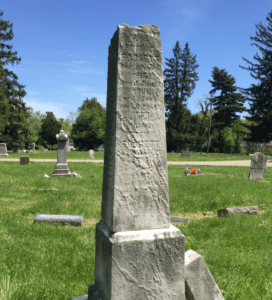Sarah Mayrant Walker Fossett, born into slavery in Charleston in 1826, overcame challenges to become a prominent Cincinnatian. After learning hairstyling in New Orleans, she arrived in Cincinnati in the 1840s and became renowned as the city’s top hairstylist for wealthy white women. She courageously challenged segregation in the Cincinnati streetcar system, leading to a law allowing Black women and children to ride streetcars. Sarah played vital roles in her church community throughout her life, and her legacy symbolizes Black women’s resilience and inspires the ongoing fight for equality.

Sarah’s Journey
Sarah Mayrant Walker Fossett was born in Charleston, South Carolina, on June 26, 1826. She started her life as an enslaved child to Rufus and Judith. When she was young, her parents sent her to New Orleans, where she learned the art of hairstyling and the production of hair goods from a French specialist.
In the 1840s, Sarah came to Cincinnati with Abraham Evan Gwynne, coinciding with the birth of Gwynne’s daughter, Alice Claypool Gwynne. While Alice went on to become the matriarch of the Vanderbilt family, Sarah’s journey was equally remarkable. With the help of the Gwynne family’s connections, she became known as Cincinnati’s top hairstylist, serving wealthy white women in the city.
Related Article: Priscilla Jane Thompson – A Voice for Black Women
Marriage & Impact

However, Sarah’s impact extended beyond her business accomplishments. On September 28, 1854, she married Peter Farley Fossett, who had been born into slavery at Thomas Jefferson’s Monticello. Peter’s parents, Edith and Joseph Fossett, lived and worked on Jefferson’s plantation. After Jefferson died in 1826, Joseph was freed according to his will. However, Edith remained enslaved, so Joseph purchased the freedom of Edith and their children. The family eventually moved to Cincinnati, where Peter and Sarah met.
Sarah built her hair empire while Peter worked as a whitewasher and caterer. Peter was actively involved in the Baker Street church, later renamed Union Baptist Church, and held essential roles within the church community. Peter also served with a unit of African Americans called the Black Brigade of Cincinnati. During the Civil War, they built defenses for the city along the Ohio River.
Related Article: Peter and Sarah Fossett, Black Abolitionists And Founders of the First Baptist Church of Cumminsville
Defying Segregation
One pivotal event in Sarah’s life was defying segregation in the Cincinnati streetcar system. Running late to style a bride’s hair, she attempted to board the Third Street Line, but the conductor blocked her. Undeterred, Sarah clung to the rails as the horses continued moving, enduring attempts to dislodge her. Despite sustaining injuries and enduring three blocks of struggle, she persisted.
The subsequent legal action awarded her $65 from the streetcar company, although she sought $1,000 in damages. Her case sparked a new law allowing Black women and children on Cincinnati streetcars while Black men remained segregated.
Sarah’s ruling also set a precedent for a later lawsuit, Isaac Young versus the Cincinnati Streetcar Company. The ruling resulted in a law that gave everyone the right to ride the streetcar regardless of color or sex unless intoxicated or suspected of criminal activity.
Related Article: Angelo Herndon – A Voice for Justice
Lasting Legacy
Sarah and Peter continued to live a purposeful life. They paid off their church’s debt and became respected leaders within the faith community. Sarah dedicated much of her time to volunteering at a recently founded Orphan Asylum for Colored Youth, where she ultimately rose to the position of manager, serving in this capacity until her passing in December 1906, following Peter’s death in 1901.

The couple rests together in Union Baptist Cemetery, a testament to their shared journey and unwavering commitment to equality, justice, and pursuing their dreams.
In 2023, the Cincinnati Preservation Society dedicated a historical marker to honor the Fossetts at First Baptist Church of Cumminsville.
Sarah Mayrant Walker Fossett’s legacy exemplifies the resilience of Black women throughout history, serving as inspiration and a reminder of the ongoing fight for equality and justice for all.
The Voice of Black Cincinnati is a media company designed to educate, recognize, and create opportunities for African Americans. Want to find local news, events, job postings, scholarships, and a database of local Black-owned businesses? Visit our homepage, explore other articles, subscribe to our newsletter, like our Facebook page, join our Facebook group, and text VOBC to 513-270-3880.
